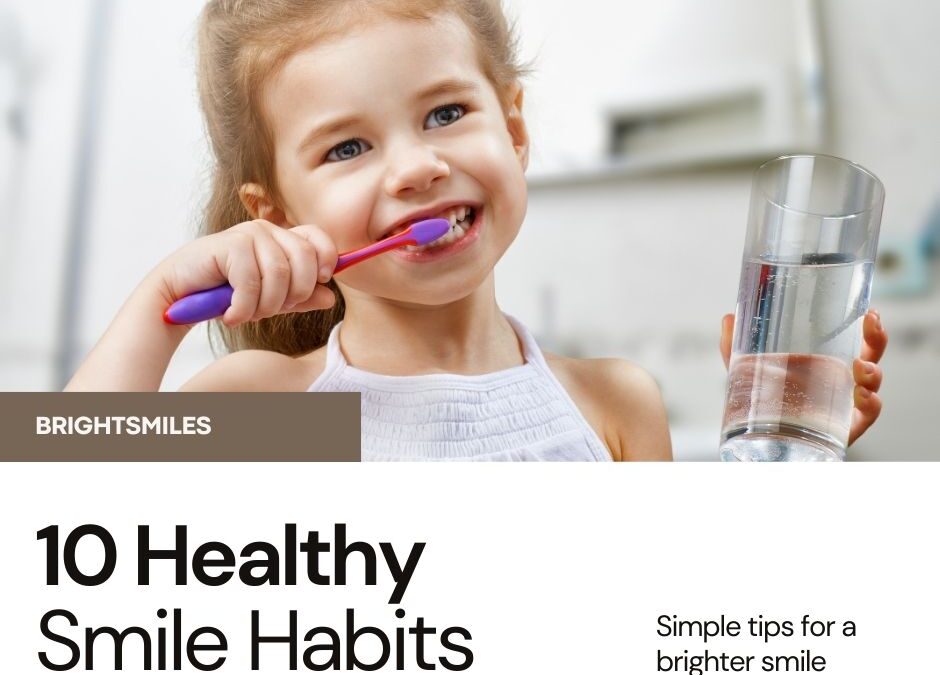A bright and healthy smile is often the first thing people notice about you. Beyond aesthetics, oral health plays a crucial role in overall well-being, affecting everything from digestion to heart health. Cultivating good dental habits can prevent cavities, gum disease, and bad breath, ensuring a lifelong beautiful smile.
Here are 10 habits that contribute to maintaining excellent oral health:
1. Brush Your Teeth Twice a Day
Brushing your teeth at least twice a day is the foundation of good oral hygiene. It removes plaque, prevents cavities, and keeps your gums healthy.
How to Brush Properly:
-
Use a soft-bristled toothbrush to avoid damaging your gums.
-
Choose a fluoride toothpaste to strengthen enamel.
-
Brush for at least two minutes, ensuring you reach all surfaces of your teeth.
-
Use gentle, circular motions rather than harsh scrubbing.
-
Don’t forget your tongue—bacteria build up there too!
2. Floss Daily
Many people neglect flossing, yet it is just as important as brushing. Flossing removes food particles and plaque from between the teeth where a toothbrush cannot reach.
Tips for Effective Flossing:
-
Use about 18 inches of floss and wrap it around your fingers.
-
Gently slide the floss between teeth and curve it around each tooth.
-
Avoid snapping the floss, as it can damage gums.
-
Consider water flossers if traditional flossing is challenging.
3. Rinse With Mouthwash
Mouthwash helps reach areas brushing and flossing might miss. It reduces bacteria, freshens breath, and strengthens enamel if it contains fluoride.
Choosing the Right Mouthwash:
-
Antiseptic mouthwash kills bacteria and reduces plaque buildup.
-
Fluoride mouthwash strengthens teeth and prevents decay.
-
Alcohol-free mouthwash is gentler and prevents dry mouth.
4. Maintain a Healthy Diet
What you eat affects your oral health. A diet rich in vitamins and minerals promotes strong teeth and gums.
Best Foods for Oral Health:
-
Dairy products (milk, cheese, yogurt) provide calcium to strengthen enamel.
-
Crunchy fruits and vegetables (apples, carrots, celery) stimulate saliva production and clean teeth naturally.
-
Nuts and seeds contain healthy fats that support gum health.
-
Leafy greens are rich in vitamins that promote healthy gums.
Foods to Avoid:
-
Sugary snacks and sodas promote cavity-causing bacteria.
-
Acidic foods (citrus fruits, coffee) weaken enamel.
-
Sticky foods (caramel, dried fruit) cling to teeth and increase plaque buildup.
5. Drink Plenty of Water
Water is essential for overall health and particularly beneficial for your teeth. It helps wash away food particles, neutralizes acids, and prevents dry mouth.
-
Fluoridated water strengthens teeth and prevents decay.
-
Drinking water after meals helps cleanse your mouth.
-
Staying hydrated keeps saliva levels optimal, which helps fight bacteria.
6. Avoid Smoking and Tobacco Products
Smoking and using tobacco products lead to serious oral health issues, including:
-
Stained teeth and bad breath
-
Increased risk of gum disease
-
Delayed healing after dental procedures
-
Higher risk of oral cancer
Quitting smoking improves oral health almost immediately, reducing your risk of gum disease and helping maintain fresh breath.
7. Visit Your Dentist Regularly
Routine dental check-ups are crucial for preventing serious oral health issues.
Why Regular Dental Visits Matter:
-
Early detection of cavities, gum disease, and oral cancer
-
Professional cleaning removes plaque and tartar buildup
-
Helps monitor and maintain overall oral health
Most dentists recommend visits every six months, but those with gum disease or other conditions may need more frequent check-ups.
8. Protect Your Teeth With a Mouthguard
If you play sports or grind your teeth at night, a mouthguard can prevent damage.
Types of Mouthguards:
-
Sports mouthguards protect against injuries from physical activities.
-
Nightguards prevent damage caused by teeth grinding (bruxism).
A custom-fitted mouthguard from your dentist offers the best protection and comfort.
9. Be Mindful of Teeth Grinding
Bruxism, or teeth grinding, can wear down enamel, cause sensitivity, and lead to jaw pain.
How to Prevent Teeth Grinding:
-
Reduce stress through relaxation techniques like meditation or yoga.
-
Avoid caffeine and alcohol, as they can increase grinding.
-
Wear a nightguard if grinding occurs during sleep.
10. Practice Good Oral Hygiene Habits From a Young Age
Developing good oral care habits early ensures long-term dental health. Parents should teach children:
-
Proper brushing and flossing techniques
-
The importance of healthy eating for strong teeth
-
To visit the dentist regularly
Using fun toothbrushes, flavored toothpaste, and reward systems can encourage kids to maintain oral hygiene.
Conclusion
A healthy smile is a reflection of good oral hygiene and overall well-being. By adopting these 10 habits, you can maintain strong teeth and healthy gums for a lifetime. Small daily changes, combined with regular dental visits, will help you achieve and maintain a beautiful, confident smile.
Start today—your future smile will thank you!

